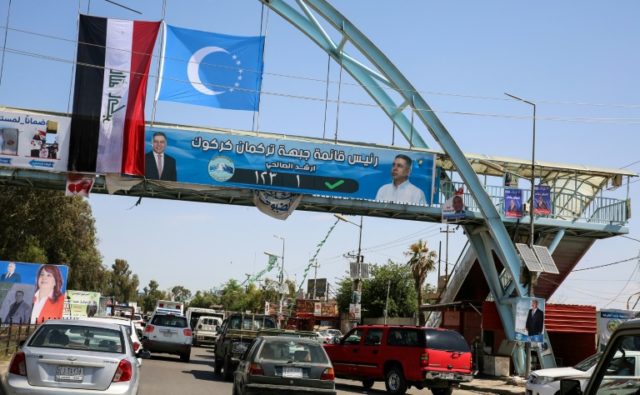The Iraqi government has removed 47 Kurdish officials from their posts in Kirkuk, beginning with the regional governor, since reasserting control over the disputed region in October 2017. The state-run North Gas Company, which operates in Kirkuk, banned the use of “Kurdish phrases” on Tuesday.
The Iraqi army, supported by Iran-backed Shiite militia units, moved into oil-rich Kirkuk in October and fought with Kurdish Peshmerga forces. The battle occurred about a month after the Kurds voted by overwhelming margins to secede from Iraq. The occupation of Kirkuk effectively ended Kurdish aspirations for independence, in part because the Kurds were dismayed by the lack of support from the United States and Europe.
The Kurds remain unhappy with the government in Baghdad and are acutely conscious of the systematic purging of Sunni Muslim Kurdish officials from Kirkuk posts by the Shiite-dominated central government. (As the Kurdish Rudaw news service pointed out on Thursday, the Iraqi government was “gentler” on Kurdish officials in majority-Shiite towns.)
Some high-ranking officials in the Kurdistan Regional Government (KRG) continue to deal with the displaced Kurdish officials while ignoring the replacements appointed by Baghdad.
While there have been official denials of a deliberate purge in the Kirkuk region, Rudaw reports that a “secret order” issued by Iraqi Deputy Interior Minister Aqil Mahmud Khaz Ali called for a massive turnover of local positions with the goal of deflating Kurdish plans for independence.
“Nowadays, Baath party laws have returned to Kirkuk,” Kirkuk provincial council member Ahmad Askari told Rudaw, referring to Saddam Hussein’s socialist political party.
“Neither the constitution nor the law has value in Kirkuk. They can do anything they want. They refill these positions with Arabs and Turkmen because they see that the KDP and PUK officials are not returning to the city. But they also remove Kurds who are still there in their positions,” Askari complained.
KDP and PUK are the Kurdistan Democratic Party and Patriotic Union of Kurdistan, respectively. The final president of Iraqi Kurdistan, Masoud Barzani, hails from the KDP. Barzani stepped down and dissolved the post of president after the independence referendum failed.
Rudaw quoted several Kurdish officials who said the security situation in Kirkuk has deteriorated since the Peshmerga was driven out and the Islamic State is making a comeback. Outside observers have criticized Baghdad for not doing enough to quell the “low-level ISIS insurgency,” which has included a number of deadly bomb attacks.
In a letter sent to North Gas Company on Thursday, Iraqi Oil Ministry General Inspector Hamdan Ojail Rashid banned the use of “Kurdish phrases” in company correspondence and required the exclusive use of Arabic.
Kurdish parliamentarian Rebwar Taha branded Rashid’s order “illegal and unconstitutional,” pointing out that both Kurdish and Arabic are recognized as official languages in Iraq.
“We will have a serious say on this matter and this is not a way to protect the Arabic language,” Taha declared, vowing legal action against the order.
Kurdish officials insisted this week that Baghdad and the Turkish government must reach a deal with the KRG before exporting oil from Kirkuk to Turkey. The KRG managed such exports before the Iraqi military moved into Kirkuk in October.
The dispute with Baghdad could become a bitter struggle for control of the pipeline to Turkey. The Iraqi government has expressed interest in building a new pipeline that would cross through less Kurdish territory, but Kirkuk Provincial Council head Rebwar Talabani stressed that it would be mutually beneficial for the Iraqi government to make a deal with the KRG to continue using existing facilities.
“Turkey and Iraq cannot take any steps regarding Kirkuk’s oil export without first reaching an agreement with the Kurdistan Region. The oil pipeline is completely under the control and protection of the Kurdistan Region,” said Kurdistan Regional Security Council adviser Bewar Khinsi.
U.S. Secretary of State Mike Pompeo talked with both Iraqi Prime Minister Haider al-Abadi and Kurdistan Prime Minister Nechirvan Barzani on Tuesday.
High on the agenda was a discussion of the massive protests in Baghdad and other cities by Iraqis angry at the poor standard of living provided by the Iraqi government 15 years after the overthrow of Saddam Hussein. Iraqi police have been criticized for using excessive force to break up the protests.
Barzani stressed to Pompeo the importance of protecting minorities in northern Iraq, including Christians and Yazidis, who were driven from their homes and targeted for genocide by the Islamic State during its rule.
According to the U.S. State Department, Pompeo praised Barzani and Abadi for their “progress in resolving outstanding Baghdad-Erbil issues, according to the Iraqi constitution’s framework for dialogue,” and for recent joint operations against ISIS by Iraqi troops and Kurdish peshmerga fighters.

COMMENTS
Please let us know if you're having issues with commenting.